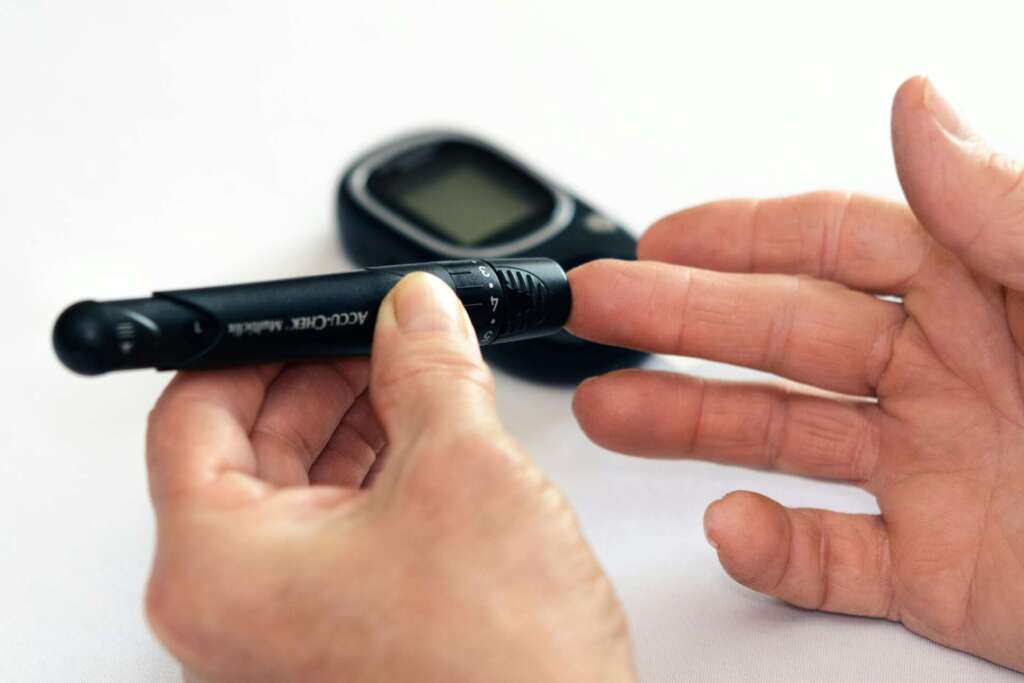What is Gestational Diabetes?
Gestational diabetes mellitus (GDM) is a condition that only affects pregnant women and is caused by high blood sugar. It’s not caused by low insulin. Instead, a hormone produced by the placenta, called human placental lactogen, makes your body more resistant to insulin, so your body can’t use insulin effectively.
As a result, glucose doesn’t enter your cells and instead accumulates in your blood, leading to high blood glucose levels. This impaired glucose tolerance can increase the risk of developing gestational diabetes, especially in pregnant women with certain risk factors such as family history, previous pregnancy with gestational diabetes, or being African American or American Indian. Understanding the impact of this condition is key to managing the disease and preventing complications.
Managing gestational diabetes involves closely monitoring blood sugar levels through blood tests and oral glucose tolerance tests (GDM testing), following a healthy diet, engaging in physical activity, and sometimes using insulin injections if the body is not producing enough insulin. Early screening and prenatal appointments are essential parts of prenatal care to ensure blood glucose remains within a healthy range, which helps protect both you and your baby’s health. Keeping blood sugar in the normal range is essential to prevent health problems like preterm birth, high blood pressure, and respiratory distress syndrome in the baby. A comprehensive diabetes management plan guided by your health care team, including your obstetrician and endocrinologist, can help you manage diabetes during pregnancy effectively and support a healthy pregnancy and a healthy baby.
What causes Gestational Diabetes?
The exact cause of gestational diabetes is not known to medical professionals. But they do know what happens. For the developing baby, the placenta is a storage house of nutrients and water. It produces several hormones that support a healthy pregnancy.
Among these hormones are:
- Estrogen
- Progesterone
- Cortisol
- Human placental lactogen
These hormones can cause a counterinsulin effect, leading to insulin resistance. This is a key factor in the development of gestational diabetes mellitus. This insulin resistance means the body’s cells cannot use insulin effectively, resulting in high blood glucose levels and impaired glucose tolerance. These changes contribute to elevated blood sugar levels during pregnancy, affecting both you and your baby’s health.
Managing gestational diabetes involves early screening, usually through an oral glucose tolerance test, and close monitoring of blood sugar levels with blood tests. A diabetes management plan that includes dietary changes, physical activity, and sometimes insulin injections is essential for disease control and preventing complications such as high blood pressure, preterm birth, and respiratory distress syndrome in the baby.
Pregnant women with risk factors like family history of diabetes, previous pregnancy with gestational diabetes, being African American or American Indian, or experiencing excessive weight gain have a higher risk of developing gestational diabetes. Maintaining normal blood sugar levels and a healthy diet can help prevent gestational diabetes and support a healthy pregnancy.
It’s essential to monitor the baby’s blood sugar levels during labour and after birth to prevent hypoglycaemia and other health problems. Coordination with your health care team, including endocrinologists and obstetricians, ensures comprehensive prenatal care and supports the goal of a healthy baby and mother.
In summary, while the exact cause of gestational diabetes is unclear, hormonal changes during pregnancy, particularly involving human placental lactogen and other hormone levels, play a significant role in disease development. Early detection and effective management are crucial to protect both you and your baby’s health throughout pregnancy and beyond.
What is the Contra-Insulin Effect?
The placenta produces more hormones as it grows. Usually, this starts around weeks 20-24 of your pregnancy. At this stage, insulin resistance becomes a bigger risk, contributing to the development of gestational diabetes mellitus. Hormonal changes, particularly changes in human placental lactogen and other hormone levels, reduce the body’s ability to use insulin effectively. This means your cells cannot efficiently absorb glucose, leading to high blood sugar and impaired glucose tolerance.
Additionally, higher calorie intake and less physical activity during pregnancy can cause higher-than-normal blood sugar (glucose) levels, increasing the risk of developing gestational diabetes. Managing gestational diabetes involves early screening, often through an oral glucose tolerance test (GDM testing), especially for pregnant women with risk factors such as family history, previous pregnancy with gestational diabetes, or being African American or American Indian.
A blood test or blood sample taken during prenatal appointments helps monitor blood glucose levels and assess disease control. Maintaining normal blood sugar levels within a healthy range is essential for a healthy pregnancy and to prevent health problems like preterm birth, high blood pressure, and respiratory distress syndrome in the baby.
Proper management includes following a healthy diet, engaging in regular physical activity, and sometimes taking insulin injections if the pancreas is not producing enough insulin. When insulin therapy is required, healthcare providers teach how to inject insulin safely to help control blood sugar levels effectively.
The American Diabetes Association and National Institute guidelines emphasise the importance of a diabetes management plan tailored to each expectant mother to prevent gestational diabetes or manage diabetes during pregnancy. This plan supports both you and your baby’s health by regulating blood sugar and preventing complications such as low blood sugar, excessive weight gain, and increased risk of developing type 2 diabetes later in life.
Monitoring the baby’s blood sugar level during labour and after birth is critical to ensure the baby’s health and prevent hypoglycemia. Coordination with your health care team provides comprehensive prenatal care focused on maintaining a healthy pregnancy and promoting the baby’s growth and overall health.
In summary, the placenta’s production of hormones, such as human placental lactogen, contributes to insulin resistance and elevated blood glucose levels during pregnancy. Early screening, regular blood tests, dietary changes, physical activity, and, if necessary, insulin injections are vital components of managing gestational diabetes mellitus to protect both the mother and the baby from potential complications, including digestive and kidney diseases, high blood pressure, and other health problems.
Diets for Blood Sugar Management

Photo by Jane Trang Doan
Foods to avoid or substitute
Eat healthy foods to manage your blood sugar:
- Choose multigrain, wholegrain, wholemeal, rye, linseed or pumpernickel bread over white bread.
- Make chapati and roti with wholemeal flour.
- Choose wholemeal pittas over white pittas.
- Choose wholemeal pasta, baked plantain or sweet potato over regular chips or mash.
- If you like rice, stick to brown.
- Stop eating cereals like Cornflakes and Rice Krispies. Instead, eat porridge made with jumbo oats, single cream, and water.
- Have plenty of vegetables with pulses such as chickpeas, beans, and lentils.
- Eat unsweetened yoghurt and milk. If you use non-dairy milk, opt for the unsweetened, fortified version.
- Eat fruits between meals, but avoid smoothies and fruit juices.
- Avoid sugary drinks. Opt for water or decaf tea and coffee instead.
- Use artificial sweeteners instead of sugar.
- Avoid all kinds of sugar, including sucrose, glucose, dextrose, fructose, lactose, maltose, honey, inverted sugar, syrup, corn sweetener, and molasses.
Remember to watch your portion sizes and your weight. Monitoring blood sugar levels closely during labour is essential to prevent complications for the baby, such as hypoglycemia, and to keep the mother’s blood sugar within the normal range.
Blood Sugar Levels

Photo by PhotoMIX Company
Regular fasting blood sugar is 70-100 mg/dL (3.9-5.6 mmol/L). For 100-125 mg/dL (5.6-6.9 mmol/L), specific lifestyle changes are needed. Diabetes is diagnosed when fasting blood sugar is 126 mg/dL (7 mmol/L) or above on two separate occasions. Also, monitor the baby’s blood sugar during labour to prevent hypoglycemia.
What is Hypoglycemia?
Low blood sugar, or hypoglycemia, occurs when your blood sugar level is below 70 mg/dL (3.9 mmol/L). It causes dizziness and blurred vision. High blood sugar increases the risk of diabetes. Average fasting blood sugar is a key to healthy habits and diabetes management.
Gestational Diabetes Symptoms
- Excessive thirst and frequent urination.
- Fatigue and weakness.
- Blurred vision.
- Nausea and vomiting.
- Frequent infections.
Some less common symptoms of gestational diabetes mellitus include slow healing of wounds or sores, frequent yeast infections, especially vaginal infections, tingling or numbness in the hands and feet due to nerve damage over time (usually in the long term), and weight loss despite increased appetite. If you experience these symptoms, see a doctor for proper evaluation and early screening. Do not ignore them, as they may indicate developing gestational diabetes or other health problems related to blood glucose levels.
Gestational Diabetes Effects

Photo by Thirdman
Pregnant women with gestational diabetes may face severe consequences for themselves and their baby. Preeclampsia and other high blood pressure conditions are among the risks the mother may encounter during pregnancy due to this condition. Also, the chance of cesarean delivery is higher. Uncontrolled gestational diabetes increases the risk of type 2 diabetes in the future.
For the baby, gestational diabetes can cause complications like macrosomia, where the baby is larger than average at birth. This can cause delivery difficulties and birth injuries. After birth, the baby may have low blood sugar and have a higher risk of developing obesity and type 2 diabetes in the future.
Screening and management are key to minimising these effects and ensuring a healthy pregnancy for mother and baby. It’s essential to check the newborn’s blood sugar level immediately after delivery to prevent and manage hypoglycemia.
Gestational Diabetes Treated
Treatment for gestational diabetes is usually lifestyle modifications, close monitoring and sometimes medication. Having a healthy diet with balanced meals that can control blood sugar is one of the most important things. Frequent exercise is also essential since it can improve insulin sensitivity.
Women who monitor their blood sugar levels can track their progress and make adjustments. Medication may be prescribed in some cases to help regulate blood sugar. This may be insulin therapy or oral medications.
Close coordination with medical professionals, such as endocrinologists and obstetricians, ensures comprehensive care throughout pregnancy. With proper management,t many women with gestational diabetes can have stable blood sugar and have a healthy pregnancy outcome.
Future Pregnancies and Gestational Diabetes

Photo by Jonathan Borba
Gestational diabetes can affect the health and well-being of the expectant mother and her baby. Women who had gestational diabetes in a previous pregnancy may be at risk for recurrence in future pregnancies. That’s why screening and care are crucial, since early detection and treatment can minimise the risks of the disease.
Birth defects
Congenital disabilities in the unborn child are one of the most significant problems associated with gestational diabetes. High blood sugar during pregnancy has been linked to fetal development and can cause structural defects or congenital anomalies, according to studies[1]. That’s why it’s essential to keep your blood sugar under control throughout pregnancy tominimisee these risks.
Premature birth

Photo by Rene Terp
Hyperglycemia can cause premature labour or require medical interventions like induction of labour or cesarean delivery. After an early birth, the baby may experience severe problems like respiratory distress and developmental delays.
Increased risk of diabetes
Gestational diabetes affects the baby’s body cells, especially those that regulate blood sugar. In response to the mother’s high blood sugar,r the baby’s pancreas may produce excess insulin and cause fetal hyperinsulinemia. This can lead to macrosomia and other complications at birth and long-term health problems for the child, like obesity and type 2 diabetes later in life.
Prevention
Before and during pregnancy, a healthy lifestyle is the key to preventing gestational diabetes. This means regular physical activity and a balanced diet with fruits, vegetables, whole grains and lean proteins. But for some women, these steps may not be enough to prevent gestational diabetes.
In these cases,s medical interventions may be needed to control blood sugar and lower the mother’s and child’s risk of complications. To control blood sugar, this may mean regular blood sugar monitoring, dietary changes, and, in some cases, insulin therapy or other medications.
Sarah’s Story
Background
I recently saw a patient, Sarah, a 28-year-old woman who was experiencing her first pregnancy. She had started to notice some persistent symptoms: fatigue, weakness, nausea and thirst. She assumed these were typical pregnancy symptoms and carried on with her daily routine, trying to manage as best she could.
Presentation
At 24 weeks, Sarah came to me for a routine check-up. She mentioned her symptoms, and I was a bit concerned by the severity and persistence of them, so I decided to run a glucose tolerance test to check for gestational diabetes.
Diagnosis
The test results confirmed my suspicions: Sarah had gestational diabetes. Sarah was overwhelmed. She worried that her condition would mean a difficult pregnancy, complicated delivery, and long-term health issues for her child.
Management and Treatment Plan
I assured Sarah that gestational diabetes can be managed well with proper care. I gave her a comprehensive treatment plan, which includes:
- Dietary Changes: I referred Sarah to a nutritionist to help her create a balanced meal plan to manage her blood sugar levels.
- Monitoring: I taught Sarah how to monitor her blood sugar at home and scheduled more frequent check-ups to monitor her condition closely.
- Exercise: I advised Sarah to do moderate exercise daily, such as walking or prenatal yoga, to help control her blood sugar levels.
- Medication: I mentioned that, if necessary, doctors may recommend insulin therapy or prescribe other medications to control her blood sugar levels.
Follow Up
With my support and that of the healthcare team, Sarah followed her treatment plan. She made significant changes to her lifestyle, eating healthier and exercising regularly. Sarah’s hard work paid off; her blood sugar levels stabilised, and she began to feel more energetic and less nauseous. Our regular check-ups showed that her baby was growing well and that there were no complications from the gestational diabetes.
Outcome
Sarah had a healthy, full-term baby boy. She mentioned to me how thankful she was for the education she received. Sarah’s story shows the importance of regular prenatal care and open communication with your healthcare provider. Gestational diabetes may seem scary,y but it can be managed and result in a healthy outcome for both mom and baby.
Key Points
Gestational diabetes can have far-reaching effects on fetal development, pregnancy and long-term health for both mum and baby. As an expectant mum, you can increase your chances of a safe pregnancy and birth and preserve the health of your unborn baby by being aware of the risks of gestational diabetes and taking action to manage it. To achieve the best outcomes for mum and baby, effective management requires early detection, close monitoring, and multidisciplinary care.
Blood sugar levels need to be kept in range, especially for expectant mums. Eat healthy foods, including a balanced diet with fruits, vegetables, and whole grains, to manage gestational diabetes and have a healthy baby.
Monitoring the baby’s blood sugar and understanding the risk factors are part of prenatal care. By eating a balanced diet and managing gestational diabetes, expectant mothers can have a healthy pregnancy and a healthy baby.
Summary
Remember, gestational diabetes can be a serious illness. Taking care of your pregnancy is essential. To ensure long-term health for mum and baby, routine postnatal care is critical. Insulin injections may be needed in some cases to manage gestational diabetes if diet and exercise alone can’t control blood sugar levels.
Watch my video on gestational diabetes below or here:
Disclaimer: The Blog/Video Content on this channel is for educational purposes and not intended to be a substitute for professional medical advice, diagnosis, or treatment. Always get advice from your doctor if you are worried or have symptoms.
References
- MMHJ van Gelder, et al. (2014). Maternal hypertensive disorders, antihypertensive medication use, and the risk of congenital disabilities: a case–control study.
- Gestational Diabetes. National Health Service (NHS). Available at: https://www.nhs.uk/conditions/gestational-diabetes/
- Diabetes in pregnancy (gestational diabetes). Guy’s and St Thomas’ NHS Foundation Trust. Available at: https://www.guysandstthomas.nhs.uk/health-information/diabetes-in-pregnancy-gestational-diabetes
Disclaimer: The Blog/Video Content on this channel is for educational purposes and not intended to be a substitute for professional medical advice, diagnosis, or treatment. Always get advice from your doctor if you are worried or have symptoms.
References
- MMHJ van Gelder, et al. (2014). Maternal hypertensive disorders, antihypertensive medication use, and the risk of congenital disabilities: a case–control study.
- Gestational Diabetes. National Health Service (NHS). Available at: https://www.nhs.uk/conditions/gestational-diabetes/
- Diabetes in pregnancy (gestational diabetes). Guy’s and St Thomas’ NHS Foundation Trust. Available at: https://www.guysandstthomas.nhs.uk/health-information/diabetes-in-pregnancy-gestational-diabetes


